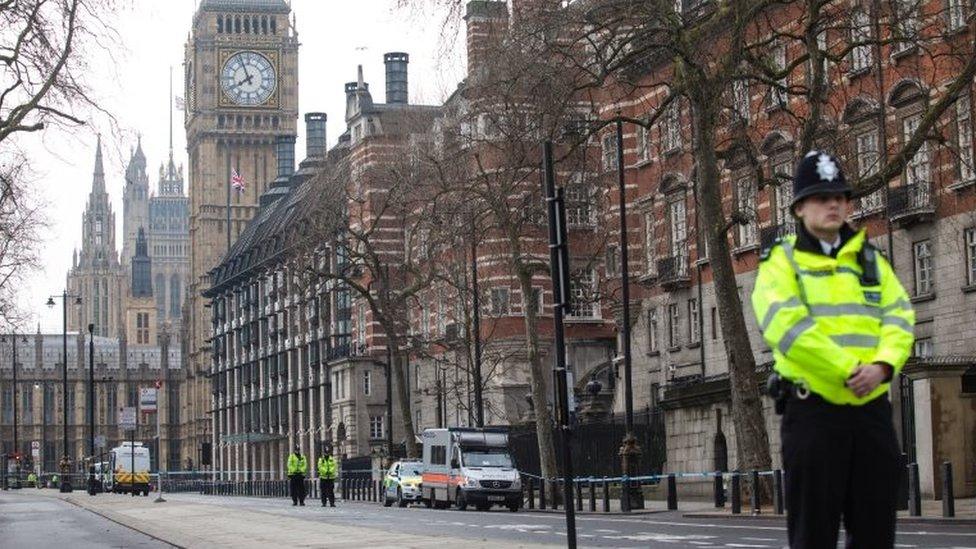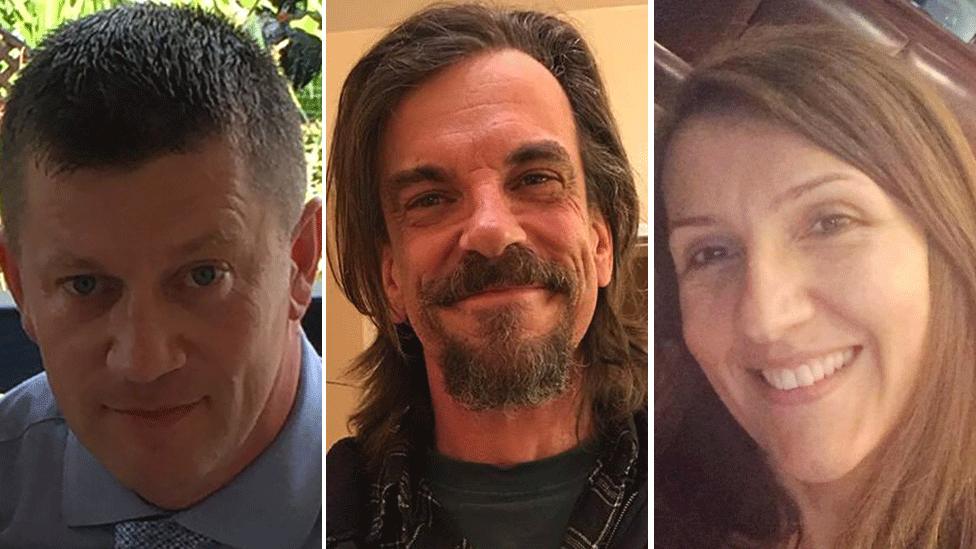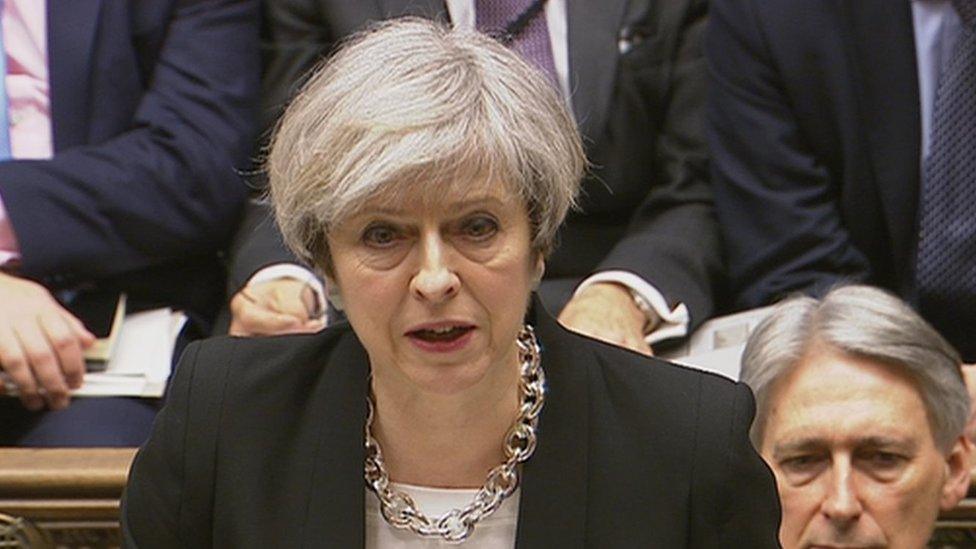'The homegrown terrorist' and UK's 'defiant' response
- Published

The newspapers are split on what action should be taken following on from the attack
Friday's newspapers focus on details emerging about Khalid Masood, the man behind the Westminster attack.
The Sun places a picture of him on their front page. The newspaper leads with his final words to hotel staff in Brighton hours before he killed four people. "I'm off to London today... It isn't what it used to be." , external
It suggests staff at the Preston Park Hotel had liked him, even writing "nice man" on his computer booking. That view contrasts starkly with the description provided by a former neighbour in Birmingham, who claims Masood's face "looked evil" when he talked about religion.
The Daily Mirror, external quotes a teacher who once lived close to his former home in Luton. She says she saw him frequently gardening and that "he was always polite".
The Times, external says Masood was brought up by a single parent in the East Sussex town of Rye and spent time in three different jails. The i newspaper, external say it was during this time that he was radicalised.
However, the Sun speculates this may have happened in Saudi Arabia where he was once an English teacher. The Daily Telegraph suggests he lived a "nomadic existence", saying electoral roll records show he lived in areas which are "notorious for pockets of Islamist extremism". , external
The standout detail for the Guardian, external is his age of 52 which, it says, is "nearly twice that of most contemporary attackers".


Some papers focus on the three named victims of the Westminster attack
Some papers want to divert attention away from Khalid Masood.
The Daily Star front page, external features smiling photos of three of his victims. "Remember them," its headline urges. "Not the murderous, fat, bald, failed teacher."
The Guardian shares the same large pictures. The Times reports that the town council of Betanzos in Spain, from where the mother of the victim Aysha Frade hailed, will hold three days of mourning.
The Mirror highlights the message of Sara Payne-McFarland, whose sister Melissa Cochrane lost her husband. "Our hearts are broken," she writes. "Kurt, you are a hero and we'll never forget you."
The Daily Mail says PC Keith Palmer was "the supercop who caught 150 crooks in a year". The paper reports that two years ago he was nominated for "best thief taker", external in the Commissioner's Excellence Awards.
Several papers print a picture taken of PC Palmer, external by tourists from Australia who had asked him to pose next to them last year.
Many of the papers raise questions about how Masood was able to reach PC Palmer in the first place.
The Times says that the gates through which he passed had been identified as a "weak point" in a parliamentary security view after the 7 July attacks 12 years ago.
The Daily Mail suggests MPs had raised questions about security at the gates two weeks ago.


The prime minister has been commended for giving a "powerful speech"
There is praise all round for the prime minister's response to the Westminster attacks.
The Times calls her address to the Commons a "powerful speech". In the Daily Mail, Quentin Letts says it was "stark but strong"., external "She opened the emotional throttle," he writes.
"She hit the right note," concludes the Daily Telegraph. "Pitch perfect,", external says the Daily Mirror.
The Guardian believes "she successfully combined dignity with emotion," maintaining "a proportionate and reasoned tone". The paper reckons that Jeremy Corbyn also "rose to the occasion"., external
But the Daily Telegraph said the Labour leader was criticised for failing to refer to the attacks as "terrorism".

As for the next steps, the papers disagree.
The Guardian commends Theresa May for resisting "the temptation to reach for new legislation". It says there was "no talk of extra powers for security services" and contrasts this with Tony Blair's 12-point plan after the 7 July bombings.
The Financial Times says the "level headed acceptance of the situation", external by the government and the public is the "correct one". The Times also maintains that "rather than bring forward more laws we need to use those we already possess".
But the Daily Telegraph asks "should the police and MI5 have kept a closer eye on" Masood?
The Daily Express puts it more bluntly. "The killer was on the radar... so how did he slip through the net?", external It suggests the government should "consider policies that would help to make the job" of the security services "easier". This means giving them the "powers and funding they need".
The Sun blames what it describes as "meddling EU judges" and the "human rights brigade", external for weakening the defence against terror by objecting to the Investigatory Powers Act. The paper also calls for "ordinary bobbies to carry guns".
This suggestion, the Times says, "would be a mistake" adding, "we cannot allow terrorism to determine our policing polices" unless it is absolutely unavoidable.
'Remain united'
The Daily Mail takes up Boris Johnson's call to control access to extremist material online.
The paper says it took two minutes to find a terrorist manual, external on how to use a car for mass murder, and calls Google "the terrorists' friend".
The Mail demands: "The web giants must clean up their acts or be made to do so by law." Google said it had removed the links.
The Sun shares the Mail's view, saying "we must also win the propaganda war".
The Daily Mirror suggests the focus should be on what it calls "the hate preachers who pour poison into the minds of those who go on to slaughter innocents, external". It supports the emphasis the Mayor of London Sadiq Khan made on remaining united.
The FT says terrorists would be delighted if the attack "provoked a populist backlash against Muslims".
The Times believes the counter-terrorism Prevent programme deserves the unqualified support of the Muslim community, saying it is tackling radicalisation head on in a small number of mosques and a larger number of prisons.
But the Guardian says it is mistrusted and seen as a "spying programme". It urges the government to promote "engagement not surveillance"., external